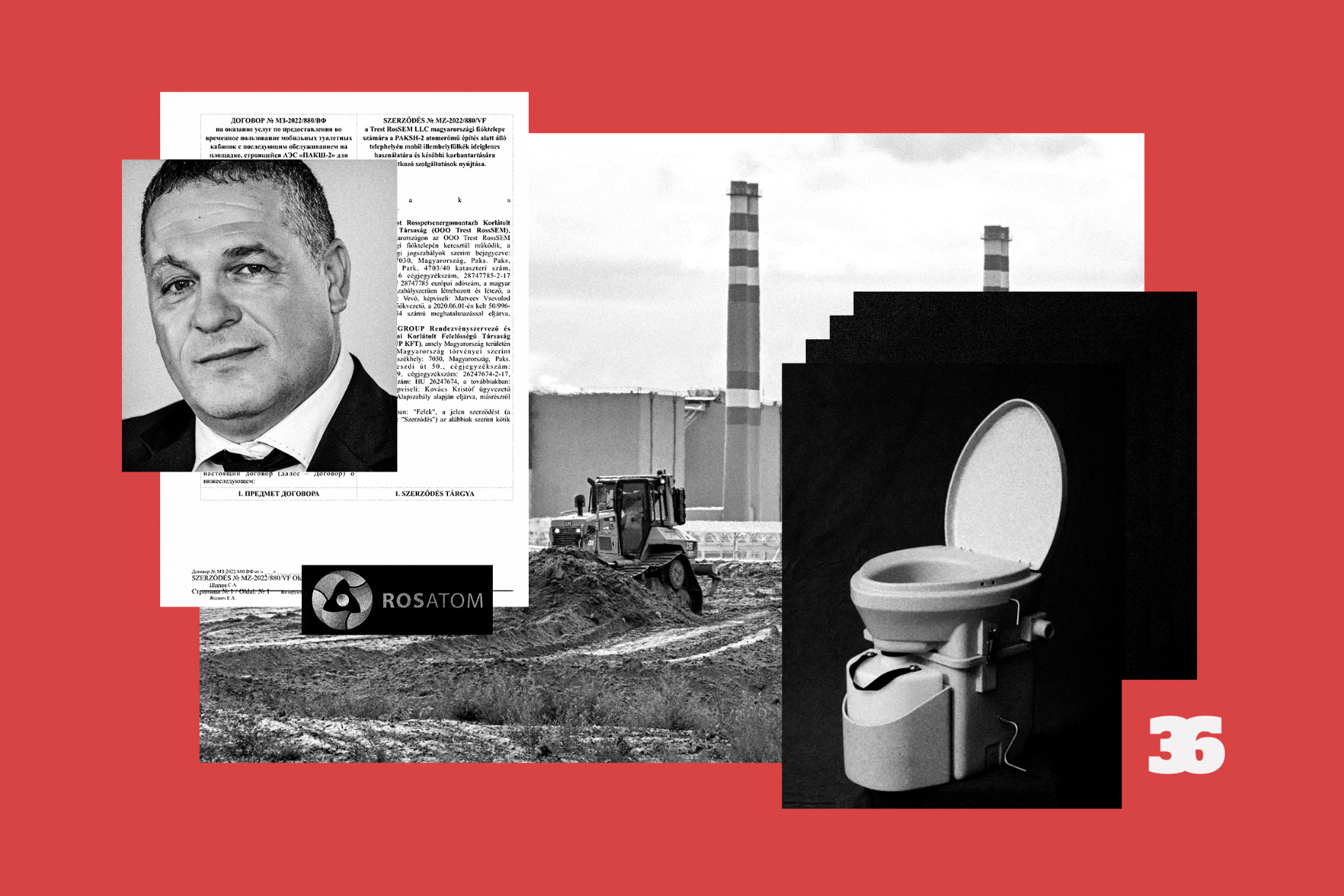While former Fidesz politician rents properties to Rosatom, his son is paid for cleaning toilets

Sándor Kovács, the former head of the Fidesz party branch in the town of Paks and a well-known businessman as in recent years made good fortune from the expansion of the Paks nuclear power plant. Rosatom, the Russian implementer of the project has so far signed contracts with his company in the amount of almost 3 million euros, mostly for the lease of real estates.
Meanwhile, another member of the Kovács family is also involved in the Paks expansion, albeit with a more modest and less prominent contract.
We at Direkt36 have been following the Paks contracts for years and recently discovered that last fall the Russians awarded KBP GROUP Ltd., the company of Kristóf Kovács, the son of Sándor Kovács, to install and maintain mobile toilet cabins at the Paks construction site in the amount of 2,900 euros gross.
According to Hungarian and Russian documents available at Rosatom’s public procurement webpage, KBP GROUP Ltd. has to deliver four “bio-toilets” and clean them twice a week during the 12-month contract period. KBP GROUP Ltd. was selected as the best bidder among four applicants.
Kristóf Kovács confirmed to Direkt36 on the phone that he was indeed the son of Sándor Kovács. He said his company participated in the Rosatom tender but did not have information on whether they indeed won it. He asked us to send our questions in writing in order for his colleagues to follow up. However, he has not responded to our written inquiry since then. Kovács characterized his company as a “local patriotic business” which among others organizes various events in Paks. According to the municipality’s webpage, in the past years it organized “coffee, wine, and pálinka festivals” and “Saint Martin’s Day goose festival” in the town.
Sándor Kovács became the local head of the ruling Fidesz party in Paks in 2017, and later also one of the deputy mayors of the town. Hungarian media outlet Népszava reported in 2017 that in addition to his position as a member of the local municipality council he also held a role in the leadership of a local municipality company, despite the conflict of interest between the two positions. After the local county government office officially determined the conflict of interest, Kovács was recalled from the company management.
In 2019, the politician withdrew from public life; he did not run again for the local Fidesz post and also resigned as a deputy mayor. According to his acquaintances, Kovács has been recently focusing on his business activities, which consist of managing his companies producing concrete tiles and wall coverings as well as renovating and renting real estates in Paks.
The real estates owned by his companies have been leased several times since 2021 by the Russian Rosatom in charge of the construction of the new Paks blocks. According to one of the larger amount contracts – previously reported by Direkt36 – the Russians rented one of his Paks properties for 847 thousand euros for the period of 36 months in the fall of 2021.
The Paks project is currently several years behind schedule, which is increasingly perceived as a problem even within the Hungarian government. Minister in charge of constructions János Lázár called it a “cardinal sin,” one of the government’s gravest mistakes that Paks II will not be able to produce electricity in 2023. When the Paks expansion contract was signed in 2014 it was meant to become operational by 2023.
One visible example of the continuous delays is that even though the project received its most important, so-called license permit last August, the construction itself could not start. The documentation of the permit request was of such poor quality that the licensing authority, the Hungarian Atomic Energy Authority only agreed to allow the start of foundation-related works.
The Paks expansion was further complicated by the war that broke out in the neighboring country. Russia, which has launched an invasion against Ukraine, is not only the main contractor of the project but also its creditor. Despite the war, the Hungarian government continues to stick to the Russians’ participation in the construction of Paks II. Following the parliamentary elections last spring, the project was transferred to Foreign Minister Péter Szijjártó who maintains visibly good relations with the Russians and who then replaced the whole Hungarian team responsible for the implementation.
Sándor Kovács continues to do business with Rosatom even amid larger political complications. Last December, for instance, the Russian nuclear energy company contracted one of his companies with the purchase of concrete in the amount of 300 thousand euros. According to our calculations, the companies of Kovács have so far signed at least seven different contracts related to the Paks expansion with a total value of nearly 3 million euros.
Cover picture: Telex


